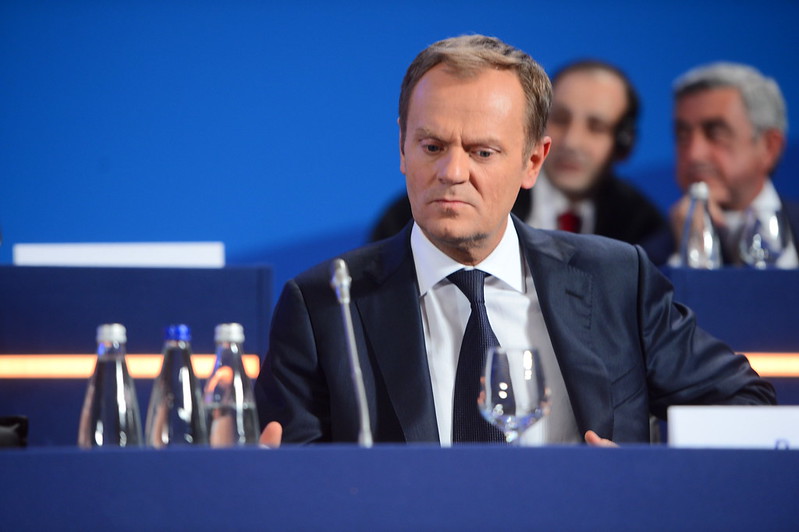Polish lawmakers have submitted a non-binding petition to Prime Minister Donald Tusk, urging cannabis decriminalization by allowing citizens to possess small amounts and cultivate one plant. Tusk must respond within 30 days. The move has sparked hopes for dialogue ahead of Poland’s presidential election, with neighboring countries like Ukraine and Germany already providing examples in the region.
Polish Lawmakers Petition Donald Tusk for Cannabis Decriminalization


Polish lawmakers from the Polish Parliamentary Commission on Petitions have submitted a petition to Prime Minister Donald Tusk advocating for the decriminalization of cannabis.
For more news like this, along with all the latest in legalization, research, and lifestyle, download our free cannabis news app.
Polish Lawmakers Petition for Cannabis Decriminalization
The petition submitted by Polish lawmakers, presented by the commission, suggests allowing Polish citizens to possess up to 15 grams of cannabis and to cultivate one plant for personal use without facing criminal penalties.
While the proposal submitted by Polish lawmakers does not carry the binding power of an official bill, it requires a response from Donald Tusk within 30 days. He must either outline potential steps for implementing the changes or justify his decision not to proceed. He may also refer the matter to another agency.
According to Wolne Konopie, a prominent Polish advocacy group, the decision by Polish lawmakers to submit a non-binding petition rather than a formal bill reflects a pragmatic assessment of Poland’s political landscape.
Advocates feared that President Andrzej Duda might veto a more formal bill. They hope instead that the petition submitted by Polish lawmakers will prompt a national dialogue that could lead to legislative action, especially in the context of the upcoming Polish presidential election in May. A strong public response could influence future political agendas and potentially sway presidential candidates’ positions.
Support and Opposition Among Polish Lawmakers
In recent months, activists have garnered support from some Polish lawmakers within Polish ministries. In September, representatives from Wolne Konopie met with a health ministry official to discuss the petition, which reportedly received provisional support. Additionally, in July, an interior ministry official forwarded the reform recommendation for review by law enforcement agencies. However, it remains to be seen how much these endorsements will resonate within government bodies.
The cannabis reform movement in Poland aligns with a broader trend in Europe, where neighboring countries are adopting their own policies on medical or recreational cannabis use. Poland’s proximity to Ukraine and Germany adds regional interest to the reform by Polish lawmakers.
Poland and the EU
Polish lawmakers are not alone in the EU. In February, Ukrainian President Volodymyr Zelensky signed a law legalizing medical cannabis. This law is notable for its potential to assist soldiers facing physical and psychological trauma from the ongoing conflict with Russia. Ukraine’s shift toward medical cannabis has been partly influenced by the unique circumstances of the war but also aligns with broader European trends in reevaluating cannabis policy.
Germany, meanwhile, has has gone one step further than Polish lawmakers, authorizing cannabis social clubs, allowing adults to grow cannabis for collective use in a private setting. The German model limits access to social clubs, where cannabis is cultivated and distributed to registered members, but nonetheless creates a controlled environment for recreational cannabis use.
Germany’s current law, which represents the first phase of a two-part legalization plan, has already seen the first cannabis distributions in social clubs this year. Pilot programs were recently announced as the foundation for a second pillar, which would establish legal cannabis sales and provide a role model for Polish lawmakers.
—
(Featured image by European People’s Party (CC BY 2.0) via Flickr)
DISCLAIMER: This article was written by a third-party contributor and does not reflect the opinion of Hemp.im, its management, staff, or its associates. Please review our disclaimer for more information.
This article may include forward-looking statements. These forward-looking statements generally are identified by the words “believe,” “project,” “estimate,” “become,” “plan,” “will,” and similar expressions. These forward-looking statements involve known and unknown risks as well as uncertainties, including those discussed in the following cautionary statements and elsewhere in this article and on this site. Although the company may believe that its expectations are based on reasonable assumptions, the actual results that the company may achieve may differ materially from any forward-looking statements, which reflect the opinions of the management of the company only as of the date hereof. Additionally, please make sure to read these important disclosures.
First published in Newsweed, a third-party contributor translated and adapted the article from the original. In case of discrepancy, the original will prevail.
Although we made reasonable efforts to provide accurate translations, some parts may be incorrect. Hemp.im assumes no responsibility for errors, omissions or ambiguities in the translations provided on this website. Any person or entity relying on translated content does so at their own risk. Hemp.im is not responsible for losses caused by such reliance on the accuracy or reliability of translated information. If you wish to report an error or inaccuracy in the translation, we encourage you to contact us.



Comments are closed for this post.